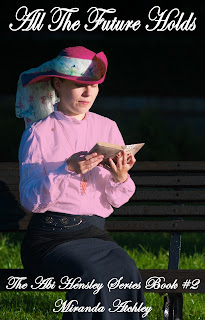The Setting of All The Future Holds
Hello readers and friends! It’s the third day of release
week for All The Future Holds. Since
this book is brand new, I wanted to do some behind-the-scenes posts to
celebrate. I enjoy reading these posts from other authors and I’ve heard from
some of you that you enjoy these types of posts as well. Yesterday I posted a
synopsis of the book and the day before that I gave a sample of the first
chapter. Today I’m talking about the setting of the book; the year 1917.
WWI and Women’s
Suffrage
When A Castle in
the Sky ended, it was the fall of 1916. WWI had already begun two years
prior in Europe, but the United States did not enter until the spring of 1917.
It was a terrible war, as any war is. It lasted four years, ending in 1918. All The Future Holds begins in January
1917, three months before the U.S.A declared war on Germany. I wanted to
continue the story of Abi Hensley’s life, and since this portion of it takes
place during one of the biggest wars in history, bits of that made their way
into the story. Instead of writing a book about WWI, I wanted to write bits
about how the war would affect Abi, seeing that this series is about her.
A common theme in All
The Future Holds is Abi’s desire to learn more about the women’s suffrage
movement and to figure out where she stands in regards to it. The women’s
suffrage movement was nothing new at this point in time. Yet it was still
prevalent as women didn’t have some of the rights they desired, such as the
right to vote and equal wages. In November of 1917, the state of New York
granted women the right to vote, yet there were still many states that did not
allow women to vote. It wouldn’t be until the year 1919 that the country would
instate the 19th amendment, and in 1920 it would be ratified.
Fashion in 1917

 Let’s talk about the clothes; because that’s the most fun
part, right? Fashion hadn’t changed much between the time of A Castle in the Sky and All The Future Holds. Women still wore
shirtwaists and day suits with large hats and elegant gowns over tightly laced
corsets that created itty-bitty waists. Yet now that America had entered WWI, I
wanted to talk a little bit about the nurses’ uniforms. They were very
different from the uniforms nurses wear now, just as the clothes every day
women wear are different than the average woman’s outfit in 1917. The nurses’
uniform was a plain grey dress with a crisp white apron over it. The nurses
wore white headdresses wrapped around their heads, and bright red crosses on their
arms, signifying they were in association with The Red Cross. In one book I
read about WWI, the author mentioned that fashion designers began making
women’s skirts with less volume in order to preserve the wool to be used for
soldier’s uniforms. This in turn made women’s wear more comfortable, allowing
them to do more, which was a sign of the times.
Let’s talk about the clothes; because that’s the most fun
part, right? Fashion hadn’t changed much between the time of A Castle in the Sky and All The Future Holds. Women still wore
shirtwaists and day suits with large hats and elegant gowns over tightly laced
corsets that created itty-bitty waists. Yet now that America had entered WWI, I
wanted to talk a little bit about the nurses’ uniforms. They were very
different from the uniforms nurses wear now, just as the clothes every day
women wear are different than the average woman’s outfit in 1917. The nurses’
uniform was a plain grey dress with a crisp white apron over it. The nurses
wore white headdresses wrapped around their heads, and bright red crosses on their
arms, signifying they were in association with The Red Cross. In one book I
read about WWI, the author mentioned that fashion designers began making
women’s skirts with less volume in order to preserve the wool to be used for
soldier’s uniforms. This in turn made women’s wear more comfortable, allowing
them to do more, which was a sign of the times.
Things certainly are different now than they were in
1917. It was a difficult time for many individuals. Yet even though it carried
its own sadness, I find the Edwardian era fascinating with its style, grace,
and progressive changes.
Be sure and come back tomorrow as I post about the books
I read while writing All The Future Holds!
Did this post whet
your appetite for a book set during WWI? Read All The Future Holds today on your Kindle, or order a paperback on Amazon!




Comments
Post a Comment
Thank you for stopping by! I hope you've enjoyed your visit. Leave a comment if you'd like; I love hearing from readers!